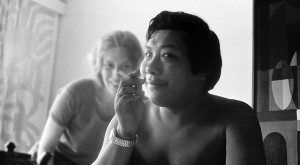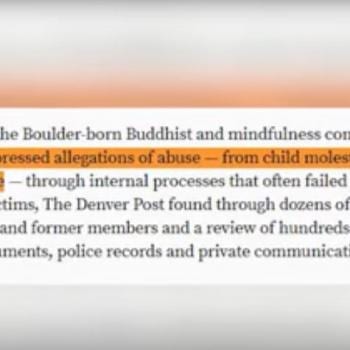Recently I was sent two DVD Screeners, this one, about the life and times of Chögyam Trungpa Rinpoche, and another called “Force of Nature” about the Japanese-Canadian scientist and environmentalist David Suzuki. I will review the Suzuki movie later this week, and today I’ll write a bit about the Trungpa flick.

Chögyam Trungpa Rinpoche, who was born in Tibet prior to the Chinese invasion, lived, quite frankly, a crazy life. Yet his charisma in teaching the Dharma and ability to motivate and inspire a generation of drop-outs and seekers across the West certainly suggests that he had great wisdom.
This well-made documentary traces the fullness of both his craziness and his wisdom. As a story of a man so instrumental in bringing Buddhism to the West, it is a film that should be seen. Having passed away in 1987, Trungpa left a broad and still flourishing Dharma movement known as Shambhala, and today at least a half-dozen biographies have been written about him. Those I have met over the years who have met him always use one word in describing their encounter: unforgettable.
Even those from distinctly different schools of Buddhism felt attracted by his unconventional, direct, and often shocking teaching methods. In the film, you get at least a hint of those – such as the story of when he invited his students to bring all of their marijuana to a retreat, and then tossing it all, bag-full after bag-full, into the fireplace chanting, “burning self deception, destroying our illusions…” (Here is a fascinating audio recording of one of the students telling what happened before the dope-burning incident, including Trungpa getting into a fist-fight with one of his students…)
And yet Trungpa himself was a heavy drinker, perhaps an alcoholic, and dying young (at age 47) quite possibly due to his heavy drinking. Such behavior, along with marrying a 16 year-old girl in England and then continuing to sleep with other students, has led many to discount his teachings and perhaps even the whole Shambhala movement. Yet before we speculate about the Modernist nature of these activities, keep in mind that such unorthodox practices have been a factor in Tibetan Buddhism from as early as we can tell (certainly dating back to the time of Yeshe O’d, 958–1055). Often in the West there is still the impulse to project a certain purity, perhaps even somber and rigid nature, to pre-Modern Buddhism. But the more we look into the history, the more we see very multi-faceted the traditions have been. So seeing a Tibetan Buddhist acting a bit ‘crazy’ perhaps shouldn’t surprise us too much.
[Anyone familiar with Aku Tunpa will know exactly what I mean. Unfortunately a web search doesn’t turn up much on this famous Tibetan rascal – perhaps an alternate spelling is needed?]
In any case, one of the bright points of the film comes up when Pema Chödrön, one of Trungpa’s best known students, discusses the tension between his wisdom and behavior, ultimately concluding with what to me appeared to be supreme honesty by saying, “I do not know. I can’t buy a party line where I say it was ‘sacred activity’ or something like this – come up with ground to make it okay. I also can’t come up with ground or fixed idea to make it not okay.”
Speaking again of influences on Trungpa, I don’t want to pick on a recent very good book too much, but this film does a nice job of showing that Trungpa was influenced by Western material culture, political ideas, military organazation, music, dress, and more (not just psychology or Romantics). And as I mentioned in a recent post, this seems to have been a factor of Buddhism since its inception.
Rachel Saltz of the NY Times suggests that “the movie goes mushy when it should be critical, and leaves you with questions that it’s not prepared to answer.” The film is definitely sympathetic, relying largely on former students still very much devoted to Trungpa, many of whom are moved to tears in describing him. While we hear about people leaving his community, we don’t get to hear from any of them. But I’m not sure what exactly they would add. What would a more critical examination of his life look like? You can read one account here, called Stripping the Gurus.
In the end I was very pleased with the movie and would definitely consider showing it in the classroom as part of a course on Tibetan Buddhism or Buddhism in the West. In either case I would be careful to provide context – if many of the events depicted in Stripping the Gurus are factual, then even more openness and honesty would have been good in the film. But even without that, I think the film opens the door for discussions of ethics in Buddhism.











